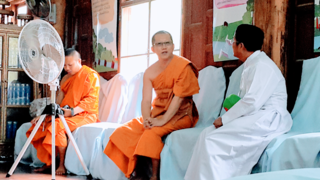Related Research Articles

The Catholic Church in Lesotho is part of the worldwide Catholic Church, under the spiritual leadership of the Pope in Rome.

The status of religious freedom around the world varies from country to country. States can differ based on whether or not they guarantee equal treatment under law for followers of different religions, whether they establish a state religion, the extent to which religious organizations operating within the country are policed, and the extent to which religious law is used as a basis for the country's legal code.
The Constitution of Cameroon provides for a secular state with freedom of religion.
The constitution of Cape Verde provides for freedom of religion, and the government has generally respected this right in practice. Government policy continued to contribute to the generally free practice of religion. There were no reports of societal abuses or discrimination based on religious belief or practice.
The Constitution provides for freedom of religion, although it prohibits what the Government considers to be religious fundamentalism.
The Transitional Charter of October 2022 established Chad as a secular state and affirmed the separation of religion and state; it also provided for freedom of religion.

The Constitution provides for freedom of religion, and the government has generally respected this right in practice. Buddhism is the state religion.

In 2022, the constitution of Belgium provides for freedom of religion. The law prohibits discrimination based on religious orientation; however federal law bans face-coverings being worn in public.

Yemen is an Islamic society. Nearly all Yemenis are Muslims, with approximately 60% belonging to Sunni Islam and 40% belonging to Shia Islam (Zaidi). Amongst the native population, there were approximately 1,000 Christians, and 6 remaining Jews in 2016. However, Pew-Templeton estimates the number of Christians to be as high as 40,000, though most do not publicly identify as such, due to fears of religious persecution. According to WIN/Gallup International polls, Yemen has the most religious population among Arab countries and it is one of the most religious populations world-wide.

Christianity is the largest religion in Benin, with substantial populations of Muslims and adherents of traditional faiths. According to the most recent 2020 estimate, the population of Benin is 52.2% Catholic, 24.6% Muslim, 17.9 Animist and 5.3% follows other faiths or has no religion.

Christianity is the largest religion in Tanzania, with a substantial Muslim minority. Smaller populations of Animists, practitioners of other faiths, and religiously unaffiliated people are also present.

Christianity is the majority religion in Cameroon, with significant minorities of the adherents of Islam and traditional faiths.

Christianity is the largest religion in Cape Verde, with Roman Catholics having the most adherents. Different sources give varying estimates on the relative sizes of various Christian denominations. More than 94% of the population of Cape Verde is Christian, with almost 85% being Roman Catholic. About 5% of the population is Protestant. The largest Protestant denomination is the Church of the Nazarene. Other groups include the Church of the Nazarene, the Assemblies of God, Seventh-day Adventist Church, the Universal Church of the Kingdom of God, independent Baptists and various other Pentecostal and evangelical groups.

The majority of the population of East Timor is Christian, and the Catholic Church is the dominant religious institution, although it is not formally the state religion. There are also small Protestant and Sunni Muslim communities.

Christianity is the predominant religion in Solomon Islands, with Anglicanism being the single largest denomination.

Christianity is the largest religion in Nauru, with Nauru Congregational Church being the largest denomination, encompassing 35.71% of the population as of the 2011 census.
Christianity is the dominant religioninPalau, practiced by around 91.3% of the total population, according to the 2015 census. Freedom of religion is enshrined in Palau's constitution.
The Constitution of Panama provides for freedom of religion.

Christians in Guinea-Bissau constitute approximately 19% of the country's population.
The status of religious freedom in Europe varies from country to country. States can differ based on whether or not they guarantee equal treatment under law for followers of different religions, whether they establish a state religion, the extent to which religious organizations operating within the country are policed, and the extent to which religious law is used as a basis for the country's legal code.
References
- 1 2 3 4 5 6 US State Dept 2022 report
- ↑ "població d'Andorra a 31 de desembre de 2021" . Retrieved 12 June 2023.
- ↑ CIA handbook, retrieved 2023-08-28
- ↑ Catholics and Culture website, retrieved 2023-08-08
- ↑ The ARDA website, retrieved 2023-08-28
- ↑ Perennial Pyrenees website, article dated April 24, 2017
- ↑ Freedom House website, retrieved 2023-08-08
- United States Bureau of Democracy, Human Rights, and Labor. Andorra: International Religious Freedom Report 2007. This article incorporates text from this source, which is in the public domain.
- United States Bureau of Democracy, Human Rights, and Labor. Andorra: International Religious Freedom Report 2015. This article incorporates text from this source, which is in the public domain.
- US State Dept 2022 report This article incorporates text from this source, which is in the public domain.